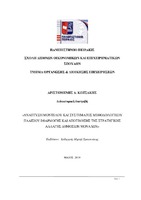Ανάπτυξη μοντέλου και συστήματος μεθοδολογικού πλαισίου εφαρμογής και αποτίμησης της στρατηγικής αλλαγής δημοσίων μονάδων

Προβολή/
Λέξεις κλειδιά
Οργανωσιακή αλλαγή ; Στρατηγική αλλαγή ; Αναδιάρθρωση ; Συγχωνεύσεις ; Μεταρρυθμίσεις ; Μη γραμμική παλινδρόμηση ; Αλγόριθμοι μηχανικής μάθησης ; Μοντελοποίηση ; Ψυχοκοινωνικό ρίσκο ; Οργανωσιακή διάγνωσηΠερίληψη
Η τρέχουσα διδακτορική μελέτη διερευνά τις επιπτώσεις των στρατηγικών οργανωσιακών αλλαγών στην ψυχοκοινωνική ισορροπία του Ανθρώπινου Παράγοντα των δημόσιων μονάδων. Επιπλέον, διερευνά τους ψυχοκοινωνικούς μηχανισμούς που εξηγούν αυτές τις επιπτώσεις, τα σχετικά ευρήματα και τις συνέπειές τους, μέσω ενός συστήματος διαχείρισης της αλλαγής που επικεντρώνεται στην μοντελοποίηση και την αποτίμηση των ψυχοκοινωνικών κινδύνων και των ευκαιριών ανάπτυξης για τον Ανθρώπινο Παράγοντα. Η μελέτη περιλαμβάνει τη διερεύνηση των άμεσων και έμμεσων επιπτώσεων της αναδυόμενης οργανωσιακής δομής στο ανθρώπινο κεφάλαιο που τεκμηριώνεται με μια εις βάθος ανάλυση των μηχανισμών ψυχοκοινωνικών αιτίων και αποτελεσμάτων που εξηγούν αυτά τα αποτελέσματα. Αναλύει δομεί και προτείνει ένα ευέλικτο πλαίσιο για την αξιολόγηση της οργανωσιακής αλλαγής, με βάση τα τρέχοντα ευρήματα και συμπεράσματα της έρευνας. Χρησιμοποιούμε τις ελληνικές διαστάσεις του ψυχοκοινωνικού ερωτηματολογίου της Κοπεγχάγης (COPSOQ III ) ως μεταβλητές του εννοιολογικού πλαισίου για την διαχρονική παρακολούθηση της στρατηγικής οργανωσιακής αλλαγής. Ως εκ τούτου, στην ακόλουθη μελέτη οι ερευνητικοί μας στόχοι είναι να μελετηθεί, να σχεδιαστεί και τελικά να προταθεί η μεθοδολογία που θα επιτρέπει την εφαρμογή μιας «εξατομικευμένης» προσέγγισης στη διάρκεια της μοντελοποίησης :
1. Ενός «γενικευμένου πλαισίου» διαχρονικής αποτίμησης της οργανωσιακής αλλαγής με μετρήσιμα τεκμήρια που να περιλαμβάνει τον υπολογισμό συγκεκριμένων δεικτών που αφορούν στο οργανωσιακό περιβάλλον και τις επιπτώσεις της οργανωσιακής αλλαγής ( με συστηματική διαχρονική μέτρηση)
2. Ενός «ευέλικτα προσαρμόσιμου συστημικού μοντέλου», εστιασμένου στην δυνατότητα για βέλτιστη «προσαρμογή και εξατομίκευση» του παραπάνω «γενικευμένου πλαισίου», στο «οργανωσιακό αποτύπωμα» του ερευνητικού δείγματος υποστηρίζοντας έτσι (διαχρονικά) τις προληπτικές ή διορθωτικές «ανθρωποκεντρικές» παρεμβάσεις μείωσης του συνολικού κινδύνου αποτυχίας της εκάστοτε στρατηγικής-οργανωσιακής αλλαγής.

